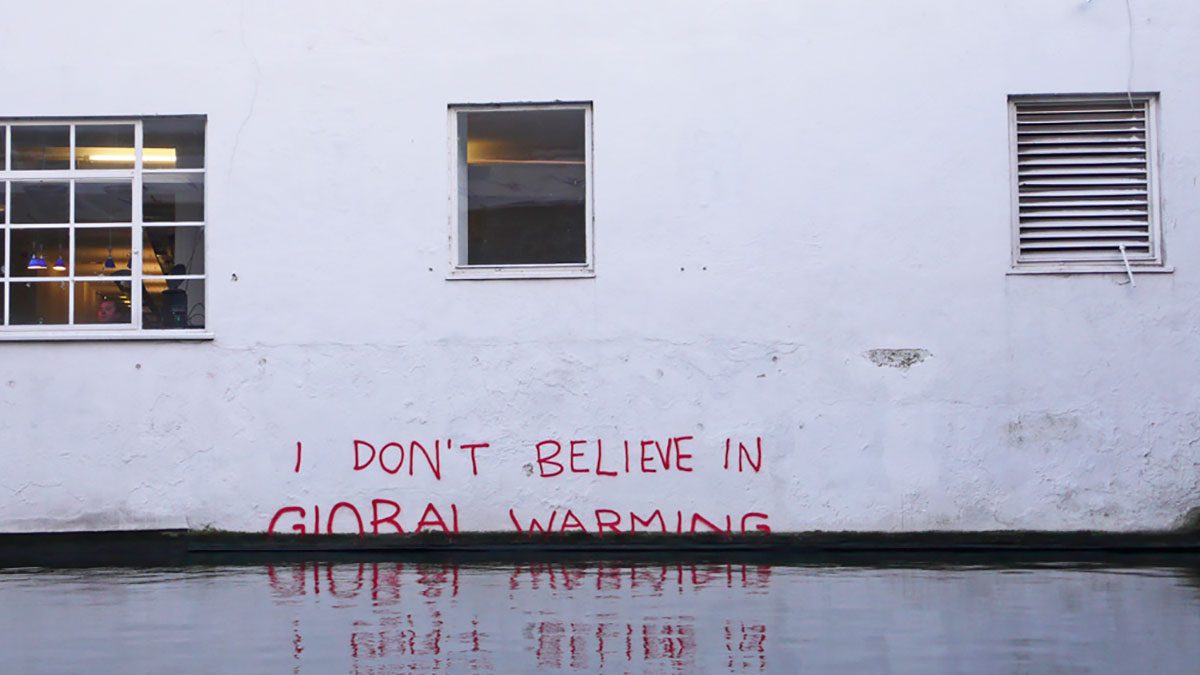Global warming first came to wide public attention in the late 1980s. A crucial turning point was the presentation that climate scientist James Hansen made to Congress in 1988. At that time a large majority of Americans proved receptive to the idea of climate change. A poll conducted in 1992 showed 88% of respondents believing that global warming was ‘a serious problem.’ The near-consensus encompassed both major parties, with Republican as well as Democratic politicians open to proposals for preventive action.
By 1997, however, only a minority of respondents considered global warming a serious problem — 42% (with only 28% supporting immediate action). What had happened to shatter what had seemed an emerging consensus? In his book The Petroleum Papers Geoff Dembicki argues that the decisive factor was a massive campaign of disinformation orchestrated by the Global Climate Coalition and generously funded by fossil fuel interests – above all, by Exxon and Koch Industries.
Public recognition of climate science grew again in the early 2000s, but a renewed effort by the deniers reversed this process. Global warming lost its status as a bipartisan issue: since Trump won the presidency in 2016 the Republican Party has been monolithically denialist (at least in public).
There are various degrees of denialism. The very idea that the climate is changing may be ridiculed or dismissed out of hand. Or climate change may be acknowledged but attributed wholly to natural causes. Or it may be claimed that climate change is too uncertain to justify costly action.
Denialism in the broad sense of denying truths that commercial interests find inconvenient is nothing new. The same ‘Public Relations’ firms and consultants who now deny global warming were previously employed by the tobacco companies to deny the harm that smoking does to health. Liars for hire have followed the same basic playbook ever since Sigmund Freud’s nephew Edward Bernays created the PR industry in the 1920s. True, the stakes have risen – from the lungs of smokers to the ‘lungs’ of the planet.
What Do Executives Believe?
What do the executives and capitalists who fund the denialist campaign themselves believe? We cannot rely on their public statements, as these reflect not their personal beliefs about reality but calculations of corporate advantage.
Some oil companies – British Petroleum, for instance – recently changed their tune. They evidently concluded that it may be advantageous to pay lip service to climate science. At the same time they secretly continue to fund climate denialists. The rationale for such apparently inconsistent behavior may be that different kinds of propaganda are required for different audiences.
They may be thinking along the following lines: ‘The more people remain unconcerned about global warming the better for us. But denying climate change can only anger those who are deeply committed to alarmist ideas. To placate them we must agree that fossil fuels will have to be given up eventually and claim that we are earnestly working toward an energy transition. That will give us at least a few more years of business as usual.’
Executives, I suspect, care very little if at all about what is true. They care about what is profitable. Those who have fought their way to the top of corporate hierarchies are a very select group. They have undergone selection not only for performance as profit-makers but also for loyalty to the culture of profit-making. An employee lower down the hierarchy who even raises an issue of ethics or scientific truth — or anything else that may get in the way of the pursuit of profit – risks summary dismissal.
Very occasionally a top executive experiences a shock that temporarily diverts him from the single-minded pursuit of profit. This is what happened to Warren Anderson, CEO of Union Carbide Corporation, in December 1984, in the wake of a leak of poisonous gas from an insecticide plant owned by the company’s Indian subsidiary in the city of Bhopal. Some 15-20,000 people were killed and half a million survivors suffered blindness, respiratory problems, and other effects. Anderson declared that he felt responsible and intended to devote the rest of his career to righting the wrong done. This immediately set alarm bells ringing. Had he persisted in his new resolve, he would surely have been ousted by one means or another. Against the advice of colleagues he set off for India to investigate, only to be arrested on arrival. The US government had to intervene to rescue him. After this episode he seems to have calmed down. He retired in 1986.
It may be argued that over the long term climate change threatens profit-making along with all other human activities. There will be no profits to be made if the Earth turns into a second Venus. However, the time horizon of capital is short – a decade or two at most. The famous British economist John Maynard Keynes expressed a typical capitalist sentiment when in response to an appeal to consider the long term he observed: ‘In the long term we are all dead.’
The Case of Rupert Murdoch
What about the media tycoons who control what millions of people read in the newspapers, hear on the radio, and watch on TV? What do they believe? What orders do they give to their underlings?
One such tycoon is Rupert Murdoch. His vast media empire includes Fox News, News Corp, The Wall Street Journal, and The New York Post in the United States, The Australianand The Daily Telegraph in Australia, and Sky News and The Sun in Britain. For many years all these outlets were dismissive of climate change.
In 2006 and 2007, however, under the influence of his son James and especially his environmentally aware daughter-in-law Kathryn, Murdoch had a change of heart. He told his media to start taking climate change seriously. Some, like The Sun, adapted easily to the new line. Others resisted.
The people at Fox News were particularly reluctant to promote what they regarded as ‘fake science.’ Murdoch expressed confidence that he could persuade them. What may well have happened instead is that they persuaded him, or perhaps he fell out with Kathryn, but in any case he gradually started to entertain doubts about climate change.
In 2014, flying over an icy seascape in the North Atlantic, he tweeted that the view was hardly consistent with the idea of global warming. Unfortunately, no one was with him to say: ‘Yes, there’s still plenty of ice out there, but not as much as there was. And the ice is much thinner than it used to be.’
It also confused him that ‘the Arctic is shrinking while Antarctica is expanding.’ Again, no one was at hand to explain to him that more snow was falling over Antarctica due to increased precipitation; there too temperatures were rising but not yet enough to turn the snow into rain.
Murdoch is a highly educated man – he graduated from Oxford University in Politics, Philosophy and Economics (PPE) – but he never acquired an understanding of science or the ability to assess evidence in a scientific manner. It is fairly safe to assume that he is not in the habit of reading scientific reports. He needs to see climate change with his own eyes – for example, to watch the Greenland ice cap melting.
It seems odd to discuss the family dynamics and mode of thought of a single individual at such length. But if that individual happens to own as many mass media outlets as Rupert Murdoch does, then such things can actually make a great difference to the world. That is one of the consequences of the immense concentration of wealth and power.
Source. Geoff Dembicki, The Petroleum Papers: Inside the Far-Right Conspiracy to Cover Up Climate Change. Greystone Books, 2022



